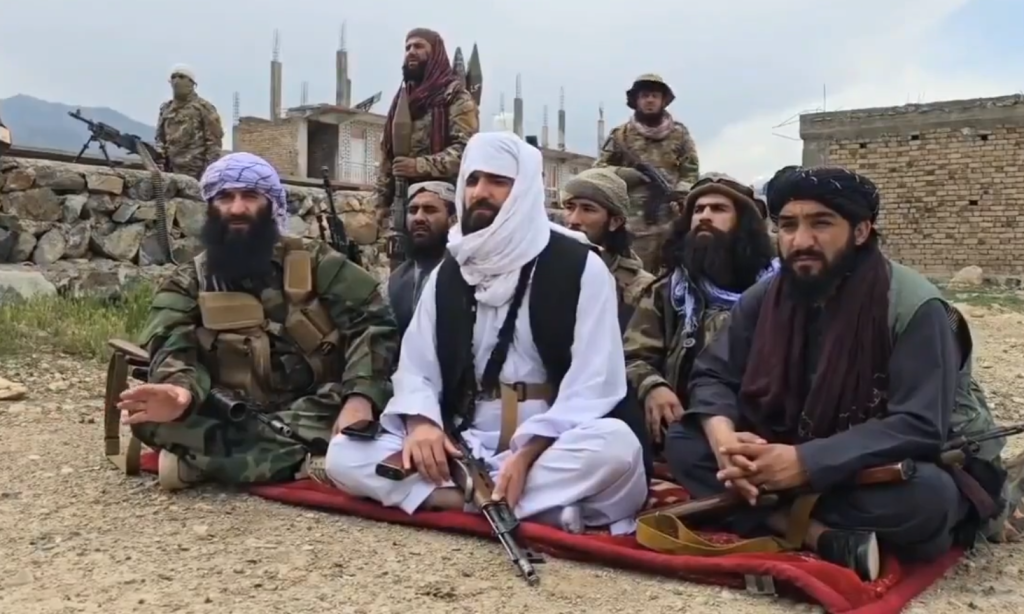A video circulating on social media shows the Afghan Taliban encouraging resistance against Pakistan and labeling the Pakistan army as “murtad,” a term used by the Tehreek-e-Taliban Pakistan (TTP). This recruitment of Afghans for the TTP and officials promoting its narrative heighten Pakistan’s concerns about a Taliban-TTP alliance. Despite the Afghan Taliban’s top leadership denying any association with the TTP and rejecting evidence of its presence in Afghanistan, the situation underscores the growing regional threat posed by terrorist organizations regrouping in Afghanistan.
A recent report by the United States Institute of Peace (USIP) highlights the expanding threat from ISIS-K, which has increased its capabilities since the U.S. withdrawal from Afghanistan. The Senior Study Group on Counterterrorism in Afghanistan and Pakistan noted that ISIS-K now poses a broader and more severe threat. Meanwhile, non-Pashtun Taliban members from Balkh, Panjshir, Kapisa, and Parwan provinces have publicly opposed ethnic bias within the Taliban ranks, marking the first such declaration since the Taliban regained power.
Hibatullah Akhundzada, the supreme leader of the Afghan Taliban, recently visited Kabul from Kandahar amidst localized conflicts between farmers and Taliban anti-narcotic units and warnings from non-Pashtun Taliban about ethnic discrimination. This visit also follows devastating flash floods causing significant damage in northeastern Afghanistan, further complicating the internal stability of the country.
Under the Taliban’s interim regime, Afghanistan is once again becoming a hub for terrorism, posing a threat to regional and international peace. Global jihadist organizations and regional terrorist outfits are reportedly regrouping in the war-ravaged country. The UN and other watchdog agencies have issued warnings about potential alliances among militant groups, allegedly supported by the Afghan Taliban. A UN Security Council report confirms a link between the TTP, al-Qaeda, and the Afghan Taliban, reflecting long-standing alliances formed during the fight against US-led NATO forces in Afghanistan.
Despite these concerns, the Afghan Taliban continue to deny that Afghan soil is used for attacks against other countries. Pakistan has repeatedly urged the Afghan Taliban to act against Pakistani militant organizations like the TTP, which have been carrying out attacks inside Pakistan. The lack of action has strained bilateral relations, with a rise in cross-border terrorist attacks exacerbating tensions. Pakistani intelligence and security agencies have reported Afghan involvement in several high-profile attacks in Pakistan, with evidence of modern NATO weapons being used in these attacks. These weapons were likely left behind during the US withdrawal and have since fallen into the hands of terrorists.
Baloch terrorist outfits such as the Baloch Liberation Army (BLA), Baloch Liberation Front (BLF), and the Majeed Brigade are also reportedly receiving support from across the Afghan border. These groups have formed loose alliances with the TTP and have participated in joint attacks in Balochistan. Afghan soil is reportedly being used by these groups for refuge and operational bases, further complicating the security situation.
Pakistan has attempted negotiations with the TTP, facilitated by the Afghan Taliban, but the conditions proposed by the TTP were unrealistic. As a result, Pakistan has warned of potential military action against militant hideouts in Afghanistan if cross-border attacks continue. While this is a last resort, Pakistan maintains that it will take necessary measures to protect its borders and national security.
The international community has yet to recognize the Taliban’s interim government due to its failure to fulfill promises made in the Doha peace accord, particularly the commitment to prevent Afghan territory from being used for international terrorism. The Taliban’s reluctance to address these issues risks plunging Afghanistan into further conflict, with the Afghan people being the primary victims.
For regional stability, the international community must engage with the Taliban government and encourage dialogue to address these security concerns. Failure to do so could lead to Afghanistan becoming a significant threat to regional peace, requiring urgent and coordinated international efforts to prevent further destabilization.


